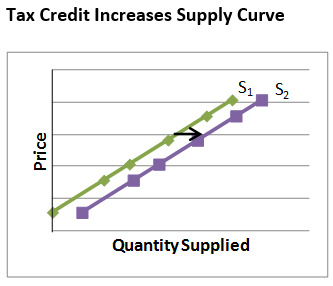Tax Credit
View FREE Lessons!
Definition of a Tax Credit:
A
tax credit is a direct deduction of a tax bill. A tax credit is intended to reward businesses for behaviors that help their employees, community, and/or the economy.
Detailed Explanation:
Governments may provide a tax credit to assist certain businesses. A tax credit is a direct deduction of a tax bill. Its intent is to reward businesses for behaviors that help their employees, community, or economy. Assume a business owes $100,000 in taxes in a specific year. Also, assume the business makes several investments that year that carried a tax credit of $10,000. The business would owe only $90,000 in taxes. (The $100,000 amount owed before the credit less the $10,000 tax credit.) Think of a tax credit as a negative tax, so a credit would reduce costs and result in a rightward shift in the supply curve.

Dig Deeper With These Free Lessons:
Changes in Supply – When Producer Costs ChangeGross Domestic Product – Measuring an Economy’s Performance
Fiscal Policy – Managing an Economy by Taxing and Spending
Supply – The Producer’s Perspective
Who Really Pays an Excise Tax
